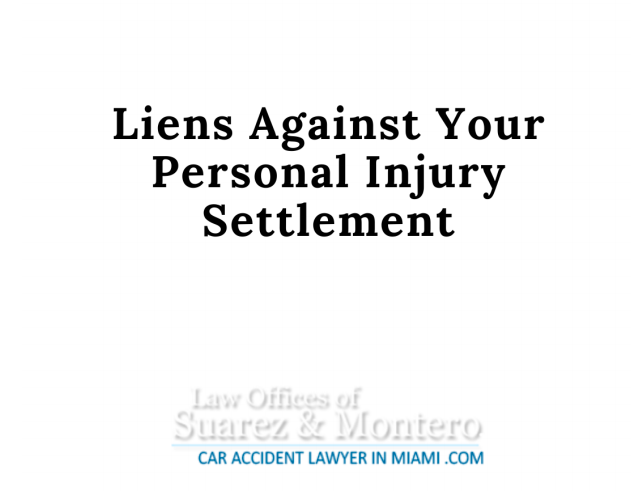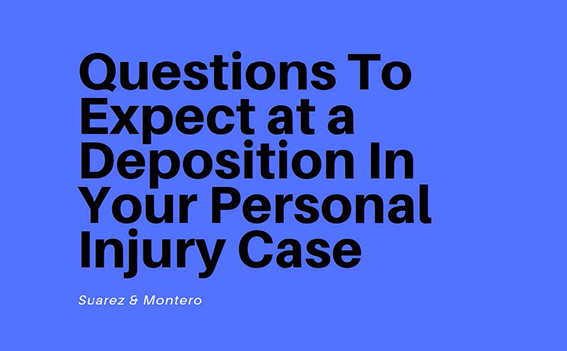
Liens Against Your Personal Injury Settlement
Today, no matter how careful you are, the chances are quite high that you will be injured in an accident that was caused by someone else’s negligence. If being injured isn’t already bad enough, the way injury victims are treated by insurance companies can sometimes be even worse. In our experience, insurance companies do their best to deny or reduce your injury claim and if they must pay your claim, they will try to delay if possible before they must issue payment. It is important to be prepared before being involved in an accident so that your actions can make the difference between receiving a complete settlement for your damages or receiving a small settlement for your damages that barely covers the cost of properly treating your injuries. If you’re about to settle your personal injury claim or you’ve just settled it, you should be aware of any lien holders. A lien holder is an individual or organization to whom you legally owe part of your settlement compensation. There are several types of legitimate lien holders in personal injury claims and they include doctors, hospitals, clinics, or other health care providers.
Types of Liens
If you were injured and didn’t have the money to pay your medical bills and someone advanced either the money or the health care services you needed, you probably have a duty to pay them back. If you were in this situation there’s a good chance, there’s one or more liens against your settlement proceeds. Each state has its own laws and regulations governing how a lien must be perfected. If your healthcare insurance company paid your medical bills while your personal injury claim was in process, they may have a legitimate lien against your settlement. If your medical provider treated you without requiring immediate payment, they may have a legitimate lien against your settlement. A lienholder must advise you of their intent through a letter of protection or other legally acceptable form of notification. You should set aside money from your settlement proceeds to satisfy any unpaid services. If you fail to do this, you may be sued by the lienholder.
What is a Letter of Protection?
Healthcare providers such as doctors’ hospitals and clinics can legitimize their liens by either having you sign a letter of protection before treating you or by exercising their lien rights under the law in Florida. Generally, a Letter of Protection or “LOP” is a contractual agreement between a patient and their doctor. In this contract, the doctor is agreeing to provide medical treatment to the patient. Additionally, the doctor is agreeing to not send the patient to collections for failure to pay until the conclusion of the patient’s personal injury case. The doctor agrees to provide this treatment without regard to whether the patient prevails in their personal injury claim. As for the patient, the patient agrees to pay the doctor for their work at the conclusion of the patient’s personal injury case. Simply, by executing a letter of protection agreement, your doctor is agreeing to delay collecting money on your medical care until your case gets resolved and you are agreeing to pay the doctor out of any personal injury settlement proceeds or judgments you obtain at the conclusion of your personal injury case.
Speak with a Miami Accident Attorney Today!
Selecting a lawyer to represent an individual in any case can be one of the most crucial factors in the success or failure of a case. Selecting a lawyer can be an intimidating process for those who have never faced a situation that required an attorney’s professional experience. The process of choosing a lawyer is quite like the process of choosing a doctor. This is because every client wants a lawyer who is experienced, skilled, and ethical. While all attorneys may be licensed to practice law, not all attorneys know how to properly handle personal injury claims. Just as it is crucial in any relationship to form good communication skills, this is just as important in an attorney-client relationship. To establish a positive relationship between a client and our firm, we believe it is our mission to make sure our clients remain well informed and comfortable throughout the entirety of their case. Our attorneys are ready to provide proven legal representation and stand ready to protect your rights. We are available 24/7 to give you a free, no risk case consultation!
We serve clients throughout Florida including those in the following areas:
Miami-Dade: Aventura, Coral Gables, Doral, Fontainebleau, Hialeah, Homestead, Kendall, Miami, Miami Beach, Miami Lakes, North Miami, Tamiami, and Westchester.
Broward: Fort Lauderdale, Hallandale Beach, Hollywood, Pembroke Pines, and Weston; and Palm Beach County including Boca Raton, Lake Worth, and West Palm Beach.





